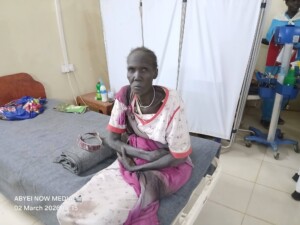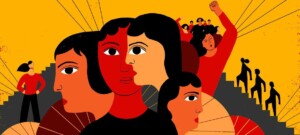Sudan Community Police beats up two women and lawyer in Khartoum
Two women and a lawyer have been subjected to excessive violence by members of the Community Police in Khartoum on Monday afternoon. The No to Women’s Oppression Initiative and the Sudanese Women Union strongly condemned the incident.
The National Human Rights Commission reported in a press statement yesterday that members of the commission visited the women victims at the Community Police station in El Deim neighbourhood in Khartoum. One of the women sustained injuries on the face, the other complained about a back injury.
 Lawyer and human rights defender El Fateh Hussein (FB page of Hussein)
Lawyer and human rights defender El Fateh Hussein (FB page of Hussein)
Two women and a lawyer have been subjected to excessive violence by members of the Community Police in Khartoum on Monday afternoon. The No to Women’s Oppression Initiative and the Sudanese Women Union strongly condemned the incident.
The National Human Rights Commission reported in a press statement yesterday that members of the commission visited the women victims at the Community Police station in El Deim neighbourhood in Khartoum. One of the women sustained injuries on the face, the other complained about a back injury.
They did not see lawyer and member of No to Women’s Oppression Initiative El Fateh Hussein, as he was released later on Monday.
The Commission stated they will contact all concerned parties “to prevent impunity and to confirm Sudan's commitment to fulfilling the requirements of the Convention against Torture”, which was recently ratified by the government. They welcomed the prosecutor's promise to enable the two women to file a complaint, urging the speeding up of the procedures.
They further stressed the need “to amend the contents of 1991 Criminal Law, to bring them in line with international human rights conventions, in a manner that preserves dignity”.
Public Order police
El Fateh Hussein related on his Facebook account following his release on Monday evening that he was “severely beaten on the head, face, and ears by members of the Community Police (the Public Order Police)”.
He said that he saw men wearing civilian clothes beating up a woman “in her forties” in El Mashtal street at about 12 pm on Monday.
He reproached the men, yet they took her and threw her “like a bag” in a van. Another woman was treated in the same way. The policemen then continued to beat the women with a hose and kick them. They then threw the lawyer in the van as well, and punched him in the face and ears.
“They then took us to the office of the Public Order Police in El Deim, where they pushed the women towards the counter and entered me inside an office. I was severely beaten again and denied a phone call. They also refused to give me a Form 8*.
After he was released, Hussein visited a doctor and went home. He said he hoped other human rights defenders would help them the following morning.
'The Sudanese woman has been subjected to violations of her dignity and humiliation over the past thirty hateful years. So don't be silent anymore!' – Sudanese Women Union
The No to Women’s Oppression Initiative group strongly denounced the violence in a statement the following day. Lawyers among their members would “take urgent action and legal measures to prosecute the elements who committed this crime. No, no to subjugation of the Sudanese citizen!”
The Legal Office of the Sudanese Women Union expressed its great concern about “the suppressing methods of the regular forces of the ousted regime by beating [people] in the streets and humiliating our people who started a revolution to restore public freedoms, for the Sudanese citizen to live in dignity”.
The office condemned “the barbaric assault” and affirmed “our readiness for continued legal support” in a statemen on Tuesday. “The Sudanese woman has been subjected to violations of her dignity and humiliation over the past thirty hateful years. So don't be silent anymore!”

Infamous law
Since the introduction of the Muslim Sharia law in 1983, the more than once amended infamous Public Order Act has enforced strict moral codes by prohibiting “indecent and immoral acts”. Most of the offenses related to interactions between men and women, producing and drinking alcohol, smoking, dancing, choice of dress, and other personal behaviour that the authorities deemed improper. The system disproportionately affected women.
On November 28, 2019, the infamous law was cancelled. “This law is notorious for being used as a tool of exploitation, humiliation & violation of rights. Along the way a lot of women and youth endured [..] unforgettable harm,” PM Abdallah Hamdok stated at the time.
Yet, members of the Public Order Police, now renamed Community Police, as well as other police officers do not seem to be convinced. In March this year, the Khartoum state police chief called for the Public Order Law to be reinstated “to combat crime”. The law should return in a new form, to preserve the society's traditions, customs, and to protect families. His proposal sparked great public outcry.
According the Strategic Initiative for Women in the Horn of Africa (SIHA), crimes of gender-based violence by Sudanese security and military forces continue to be the norm in the public and private spheres across the country. Gender-based violence by Sudanese security enforcement continue to be the norm in the public and private spheres across the country,” SIHA reported earlier this month.
* In Sudan, medical evidence of an assault is still admitted solely via the so-called Form 8. It can be issued only by police stations or approved hospitals and clinics. Critics state that the use of this form is “glaringly inadequate”, as sufficient medical evidence is often very difficult to obtain.











 and then
and then